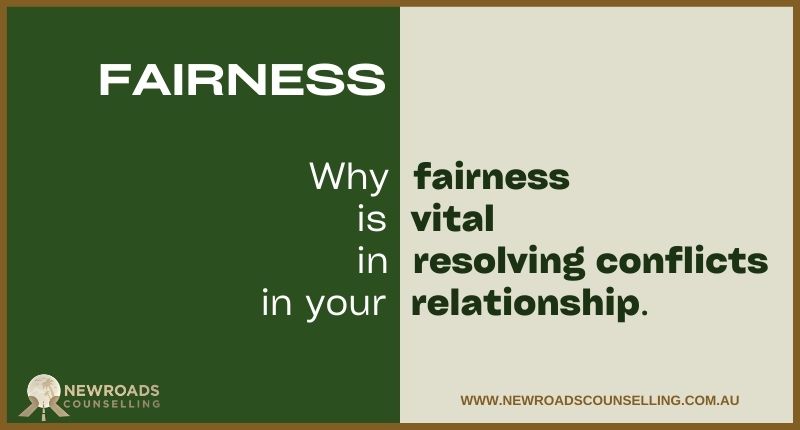Fairness is vital in resolving conflicts in your relationship. The absence of conflict does not define a healthy and happy relationship; in fact, healthy and happy relationships have conflicts that the couple can resolve. Resolving conflict can be achieved successfully when there is fairness within the process – therefore, fairness is vital. However, the absence of conflict can be because both parties avoid conflict, which leads to emotional disconnection. Similarly, too many unresolved conflicts can also lead to emotional detachment.
WHY FAIRNESS IS VITAL IN RESOLVING CONFLICTS
Fairness is vital in resolving conflict because otherwise, you will end up in a WIN-LOSE situation, which can become another issue on the top of the conflict you are trying to fix. Everyone wants to win an argument, and that’s natural. However, in a fight, it is often the person who can make the other not have an answer back who believes they have won the fight, feeling right and happy. At the same time, the other person who cannot continue the fight or has resigned from fighting won’t be satisfied and will feel it unfair to be treated as the wrong one. This unfairness won’t assist in resolving the conflict, which can slowly erode the relationship into resentment. Therefore, fairness is essential in resolving conflicts!
HOW CAN YOU REACH FAIRNESS IN RESOLVING CONFLICTS?
Fairness is not about each person getting what they want a hundred per cent because it is impossible to do so, however, it is about considering the other person’s needs rather than thinking about your own needs.
There are some steps that can help you to reach fairness and enable you to resolve your conflicts satisfactorily:
1. If one is unhappy, both will be unhappy
To achieve fairness, you need to change your belief “that if I win, I will be happy” into the new view “that if the other person is not happy, I won’t be happy too”. Remember, even though perhaps you are right, you won’t be happy because you will have to live with someone who is unhappy. If you can change your belief to “If one is unhappy, both will be unhappy”, then this will help you to work towards fairness and achieve a WIN-WIN situation. You will consider the other person’s wants, which will make the other person happy; thus, prepared to negotiate with you to meet halfway. As you and the other person meet halfway, you come to a WIN-WIN situation.
2. Accepting WINS and LOSSES together
Naturally, sometimes we fall into keeping track or score, especially when we are not happy with the result of resolving a conflict. However, if each person considers the other’s wants, each person will get some part of what they want and let go of the part that they cannot reach.
As a result, both of you will feel happy because you know it is fair. Sometimes one person might get more of what they want, but some other times they might get less of what they want, and this is fair.
3. Wait until both parties are ready
Some people are happy to come forward to resolve a conflict, while others shy away from it. Often part of the issue is that one person is not ready to discuss or resolve the conflict. Make sure you don’t force the other party to fix the conflict when they are unprepared or not ready to do so. Otherwise, you won’t be able to reach a WIN-WIN situation, or over time, both of you may fall into a pursue-withdraw cycle. At the same time, the other person cannot withhold or avoid discussing it for too long simply because they are not prepared – remember, this will cause unfairness to the other person. If you are avoidant, you need to consider the other person’s needs, and by doing so, you make the other person happy and prepared to negotiate with you.
4. Focus on one issue at a time
A common issue is where people bring past or other problems to the present subject, which will sidetrack you from being able to achieve fairness, let alone a WIN-WIN situation. You can imagine if two people list more flaws from the past or other problems of the other person, the current topic won’t be resolved. In fact, it will add to other unresolved conflicts. Therefore, stay focused on one issue at a time. Once you successfully achieve fairness and have a positive result, that will empower you to resolve the other problems.
5. Don’t hit under the belt
The prolonged unresolved conflicts often can become your “NO-GO” zone, where you are most sensitive. This “NO-GO” zone can be in the form of particular words or phrases (including labels or names) or cynicism that has been said over time in the past and specific body language (including rolling your eyes, sighing, etc.) that will trigger the other person to react. You need to avoid or not poke the other person with those words and specific body language. Don’t use it to attack or hurt the other person because you won’t get anywhere by doing so. If you are able to diligently avoid the other person’s “NO-GO” zone, you will most likely be successful in achieving a WIN-WIN situation.
Remember, conflicts between a couple are essential to clear the air and express your true and deep feelings, which can build your understanding of each other and build a closer and more harmonious relationship. However, sometimes there are much deeper issues where you need to seek some professional help to resolve those problems constructively to develop your emotional connection with your spouse/partner.

